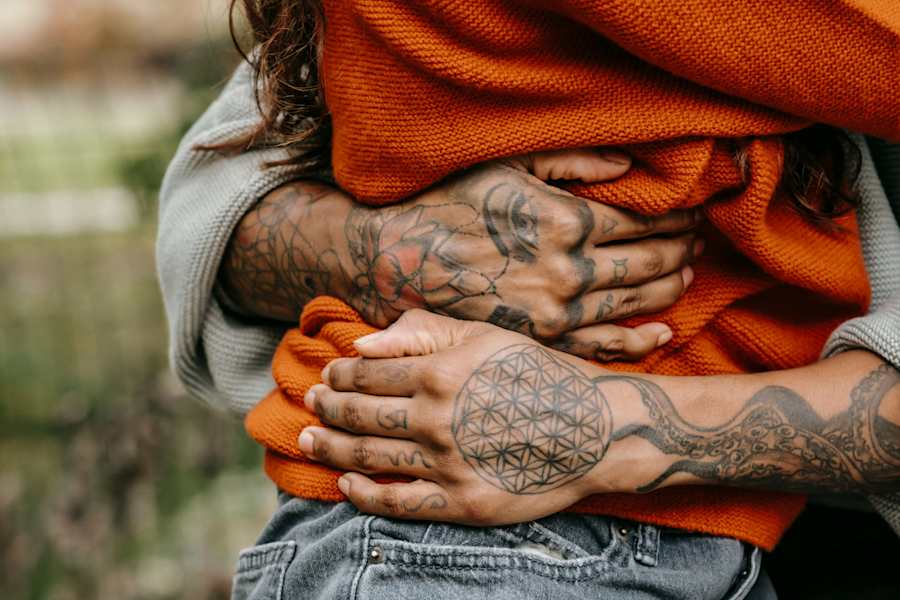
‘Racism did not begin in 2020, it is a global structure that we all perpetuate, and the unlearning of it needs to happen at every opportunity we get – even the quiet ones.’ Aisha Mirza on how to actively counter racism and discrimination on dating apps.
The incredible racial reckoning we have seen this year has left organisations, celebrities, sports teams and probably your friends scrambling to prove they are not white supremacists by donating to a Black charity one time or posting a black box on Instagram. The thing about not being racist though, is that it’s not a one-time thing. To be truly anti-racist, you have to understand that as a non-Black person, you will have soaked up and internalised so much racist messaging, particularly against Black people, that it might actually take a lifetime to unlearn. Despite the recent renewed focus on it, racism did not begin in 2020, it is a global structure that we all perpetuate, and so the unlearning of it needs to happen at every opportunity we get – even the quiet ones.
There has been successful propaganda around the idea that dating and romance, lust and love are or should be somehow exempt from racial politics. Historically it has been easier to herald the idea that love is colour-blind or desire is not political than to engage with the introspection and interrogation needed to ensure that what we consider simply our dating preferences, and the ways in which we interact on dating apps and in real life are not influenced by our racist, anti-Black, fat phobic, misogynist socialisation. We can all do better, and online dating can be a really useful tool with which to learn to check ourselves, be accountable for our prejudices and unlearn racist instincts that ultimately harm us and the people we want to share intimacy with.
Understand, accept and utilise your privilege
Social privilege is typically defined as having a ‘special, unearned advantage or entitlement, used to one’s own benefit or to the detriment of others’ (often determined by how closely you align to white cis-male heteronormativity). It can be hard for us to really own the ways in which we are privileged because it can feel like understanding that about ourselves invalidates our identities, experiences or hardships we have faced. This is not the case – our privileges are just one part of the complex web of characteristics that build a person. We are all privileged in one way or another (being white, light-skinned, straight, able-bodied, cis, male, access to intergenerational wealth – the list goes on).
Actively and consistently reflecting on your privilege through continuous research and reading will help you learn to recognise when it manifests itself in ways that are harmful to others and will also teach you to be receptive when it’s brought to your attention. Be aware that for many of the Black people and people of colour you may be talking to, constructing a dating profile to be judged and scrutinised by a (usually) majority white audience is an experience which takes a great mental toll. That’s not to mention the frequent racial micro-aggressions and slurs which have to be fielded by non-white people using these apps, even more so if they are trans, femme or fat. Be sensitive and careful not to replicate these dynamics.
‘People need to interrogate and decolonise their desire across the board, that’s not just white people, that’s all of us because it is the starting point for why we choose to interact with certain people in certain ways.’ – @SippinT in Feeld Talks: Dating and Diversity
Learn about anti-Blackness and your place in it
Society relies on a hierarchy of race that positions white people at the top and Black people at the bottom. The rest of us are floating in between, meaning that all non-Black people of colour have closer proximity to whiteness, which we have benefitted from and used to survive at the expense of Black people for centuries. In the same way that every white person is an agent of white supremacy, every non-Black person of colour is an agent of anti-Blackness and therefore also an agent of white supremacy. It’s important for all non-Black people, including people of colour, to acknowledge the privilege they have and be careful not to feed into the same harmful behaviours that often make dating apps an unsafe space for Black people. Read up on anti-Blackness.
‘Over the last month I’ve had an influx of white people liking me on dating apps and it has made me slightly perplexed but it goes into that realm of fetishisation because Black Lives Matter is this movement right now and organizations are doing this push to align with it and the masses pick up on that. It’s like being a commodity.’ – Cheri Calico Roman in Feeld Talks: Dating and Diversity.
Interrogate your ‘preferences’
Often, what we think of as simply our ‘preferences’ are actually rooted in fixed and racist ideas about what and who is considered attractive and worthy of care. Euro-centric features, close proximity to whiteness, able, thin, hairless bodies are idolised. On dating apps, Black people and people of colour (particularly those with darker skin) are often overlooked in favour of white people. Furthermore, when Black people and people of colour are engaged with, it is sometimes with an overzealous and demeaning energy that reduces us to the colour of our skin and our racial characteristics – think ‘you’re so exotic’ or ‘I love Black women’. Google fetishisation, get a grip on why you’re attracted to who you’re attracted to and then try your hardest to align your preferences with character and self expression rather than racial markers.
‘If you can google to find an app like Feeld, you can google to find why you find certain people attractive more than others for things they can’t control.’ – Tesh in Feeld Talks: Dating and Diversity
Educate yourself
Too often, people who want to learn more about issues of oppression and anti-racism, want marginalised people to educate them. Yes, this happens on dating apps, and yes, often the people wanting the free lesson aren’t even respectful or gracious about it. This sort of expectation, that Black people and people of colour are able and willing to expend energy teaching other people how to treat them with decency stems from the privilege that we need to commit to unlearning. If you have struck up a rapport with someone and want to ask them a question related to structural oppression (that you can’t Google) that may be taxing or triggering for them to answer, remember you can always give them a heads up and ask permission before launching into it.
’Stop expecting people from marginalised communities to cater to you or to coddle your feelings.’ – @Venuscuff in Feeld Talks: Dating and Diversity
Centre consent always
Do not assume the person you’re speaking to or wish to speak to is into anything they have not stated on their profile or have openly communicated. These assumptions are often informed by racialised ideas we have – Asians being submissive for example. Instead, if you’re curious, propose an open conversation about desires and see where you match. Always ask for consent before sharing or engaging in any interaction. Ask and be receptive to enthusiastic consent, and respect the other person if they say no, or refuse to interact further for any reason – even if that reason isn’t expressed. Consent must always be at the forefront and centre of all conversations.
Be kind
Anyone who has used the internet will know how cruel a place it can be. Though such a well-established phenomenon, it’s still hard to fully grasp why some people, when given a screen to hide behind, can be so truly hateful. If you feel yourself being tempted to communicate in a way that might be hurtful, damaging or lazy – stop, take a break, and interrogate your impulses.
Report racist behaviour
If you come across any racism and targeted harassment – report it. Play your part in collectively ensuring the safety of others, especially if you encounter it during a chat exchange. Be vigilant and take this on so that Black people and people of colour do not have to do it alone.


